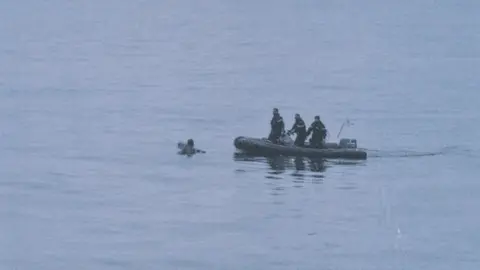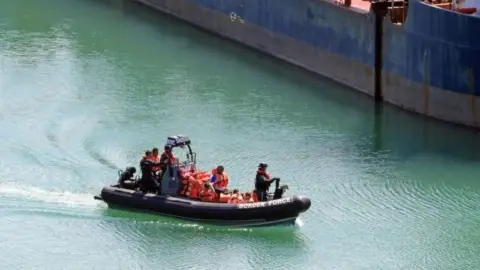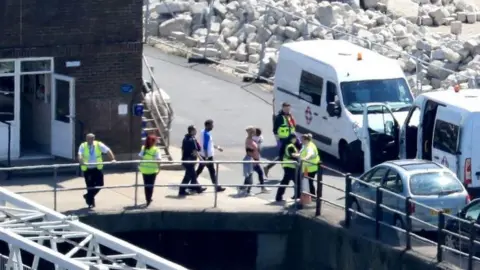Channel migrants: Man in flippers attempts Channel swim
 Prefecture Maritime de la manche
Prefecture Maritime de la mancheA migrant has been rescued as he tried to swim across the English Channel to the UK with flippers and a float.
The man - who was suffering from mild hypothermia - was picked up by the French authorities at 07:30 BST about three miles north of Calais.
Meanwhile, 38 people were caught attempting the crossing in three boats before midday, the Home Office said.
Pictures showed a woman and children as Home Office officials processed the migrants in Dover.
Another photograph appeared to show some of the people wearing orange lifejackets as they were taken to shore in a Border Force rigid-inflatable boat.
 Gareth Fuller / PA wire
Gareth Fuller / PA wireThe Home Office said a group of eight men and women were found after a boat washed ashore in Dungeness, Kent. They were medically-assessed and found to be well.
A further two vessels were intercepted off the Sussex coast.
The two groups - made up of 12 and 18 men, women and children - were taken to Dover and transferred to immigration officials.
Damian Collins, Conservative MP for Folkestone and Hythe, said of the developments: "People will almost certainly die trying to do this. I don't want to see people dying trying to make this crossing.
"We have got to do more to spot these people and stop them making these journeys before leaving the French coast."
 Gareth Fuller, PA
Gareth Fuller, PASo far this year more than 600 migrants have attempted the crossing.
Former coastguard Andy Roberts said of the lone swimmer: "I've seen every kind of attempted unorthodox crossing of the Dover Strait. This one is absolutely incredible. Anyone who thinks with a rubber ring and some flippers they can swim 21 miles as the crow flies... is really asking for serious trouble."
BBC South East reporter Simon Jones said: "The fact that one migrant was prepared to try to go it alone will no doubt be of grave concern to the authorities."
A note on terminology: The BBC uses the term migrant to refer to all people on the move who have yet to complete the legal process of claiming asylum. This group includes people fleeing war-torn countries, who are likely to be granted refugee status, as well as people who are seeking jobs and better lives, who governments are likely to rule are economic migrants.

